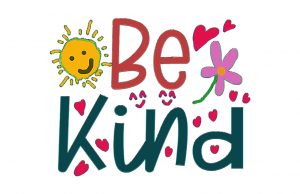Difference Between Being Nice And Being Kind: Is there a distinction between someone being nice and being kind? It’s difficult to determine at first look. When discussing people, we appear to use the words “pleasant” and “kind” interchangeably. A “pleasant person,” like a “kind person,” holds the door for others; both act in ways that show care for others. So, are “nice” and “kind” interchangeable terms?

According to dictionary.com, this is not the case. “Nice” means “pleasant; agreeable; lovely,” and “kind” means “having, displaying, or resulting from charity.” This distinction appears to explain why we use “nice” but not “kind” to describe things other than people and their interactions. “Nice shirt,” for example, is taken as a praise (although a hazy one), but “kind shirt” is a nonsense term. While “nice” and “kind” have good meanings, it appears that only the latter has an ethical relevance.
Is this to say that “kind” is only a subset of “nice” when it comes to ethical issues? Since “nice” applies to both moral and non-moral things that are appealing, it’s possible that “kind” just refers to the first set of lovely things. While the simplicity of this interpretation appeals to me, it’s possible that things can be lovely without being kind, and vice versa. The differentiating component appears to be a person’s or an act’s motivation.

Recommended: Differences between the being smart and wise
1. Niceness is Rooted in Fear: Our tribal ancestors instilled in us the value of being kind. Today, you may observe it in animals that live in packs or groups. To live, the weakest member of the pack must essentially be kind to his or her superior. If they don’t, they risk being abandoned by the group. In this example, another synonym for pleasant is submissive.
Let’s apply it to group dynamics that we may encounter in everyday life. If you have a boss who has a habit of “killing” people he or she doesn’t like, the traditional solution is to be kind to them. We want to get on this person’s good side, so we try to satisfy them. If we become friends with this individual, we are less likely to be shunned by the leader. We could even acquire power as a result of our connections. Do you see how someone who is polite stems from a fear of being judged?
I’ve discovered why females dislike good people and why we have catchphrases like “nice guys come last” as I’ve become older. It’s a type of manipulation to be pleasant. Your niceness is merely a manipulation to persuade the person from across table to like you if you’re always pleasant with a possible date. They can smell your insincerity from a mile away. Worst of all, they can detect the dread. That is the most offensive form of stink.

Recommended: Advantages and Disadvantages of being a Teacher
2. The Dishonest Nature of Niceness: When we examine being kind in this light, we can see that it is likewise founded in deception. Being pleasant frequently entails yielding to the wishes of another individual or society as a whole. We prefer to hide our genuine selves and expressions when we are kind. We simply say what other people want us to say.
In terms of being polite, dishonesty may inflict a lot of harm. Superhero flicks are one of my favorite genres. When you glance at the super villains in some of these films, you can see what they want to do. An individual can be egotistical, greedy, and power-hungry in their heart, but they’re still open about it. Because you know what that person is about, you can either agree with them or disagree with them. A pleasant person with the same bad intents conceals in the shadows of deviousness, so that people only perceive the surface level of his or her motivations. The worst kind of super villain is someone that convinces you that he or she is nice.
Also see: Countries with the best education system in the world
3. Kindness is Rooted in Love: Returning to the concepts, we do see that niceness is often employed for selfish advantage. Kindness, on the other hand, stems from the human impulse to help others. That’s what we mean when we say compassion. When we think of kindness, the first thing that comes to mind is to help others. Being kind to oneself may also imply having sympathy for oneself.
4. We grow more kind as we become more aware of the world around us: Compassion is a result of empathy, hence empathy is a fundamental factor in kindness. Kindness is the desire to assist someone who is in need. Emotion is hard to come by in today’s environment. That’s why talking about niceness is so simple. It’s simple to express since it’s merely logical. Because they have never had the emotional content, people may not know how to be kind or even what kindness is. It’s the only way you’ll be able to learn it.
Recommended: Which is Easier to learn, Python or Javascript? Answered
5. Power to the Powerless: With that in mind, let us distinguish between being polite and being kind. By being polite, you are assisting individuals who do not require your assistance in obtaining something that they do not require. When you are nice, you are assisting individuals who are in desperate need of assistance. Being pleasant is frequently addressed at someone in a position of authority.
Sure, opening the door for a lady seems gallant, but all you did was save an ounce of effort for something she could have done herself. Now, I’m not advocating slamming the door in her face, but don’t pretend that leaving the door open was your nice act for the day.
The same may be said for any superior figure. We just treat him/her well because we don’t want this individual to become enraged and make selfish demands as a result. We anticipate niceness in return when we are pleasant. Keeping the person in authority pleased makes it simpler for him or her to avoid having to cope with undesirable feelings, just like opening the door made it easier for the lady to step in. If that works, I suppose it also helps you keep out of trouble. The good individual has put up the most effort in both cases.
Recommended: Most difficult English words to pronounce
Is it better to be Nice or Kind?
Kindness is shown to those who do not have the ability to assist themselves. You’ve helped refill energy and put a stop to hunger for the time being by providing the homeless individual food. Spending quality time with the elderly provides them with a sense of security in their final years. When you speak out against prejudice, you offer someone a voice who would not otherwise have one. You provided a useful service and granted authority to someone who may benefit from it.

It’s natural to expect something in return when you’re pleasant. We only treat authority with respect so that they will treat us with respect. Kindness doesn’t expect anything in return. Most of the time, the person who receives generosity is unable to reciprocate. Being polite doesn’t guarantee happiness. When you hold a door open, you don’t receive a tingling sensation in your heart. It is preferable to give than to receive when it comes to acts of compassion. The act of kindness itself becomes a reward.

Edeh Samuel Chukwuemeka, ACMC, is a lawyer and a certified mediator/conciliator in Nigeria. He is also a developer with knowledge in various programming languages. Samuel is determined to leverage his skills in technology, SEO, and legal practice to revolutionize the legal profession worldwide by creating web and mobile applications that simplify legal research. Sam is also passionate about educating and providing valuable information to people.